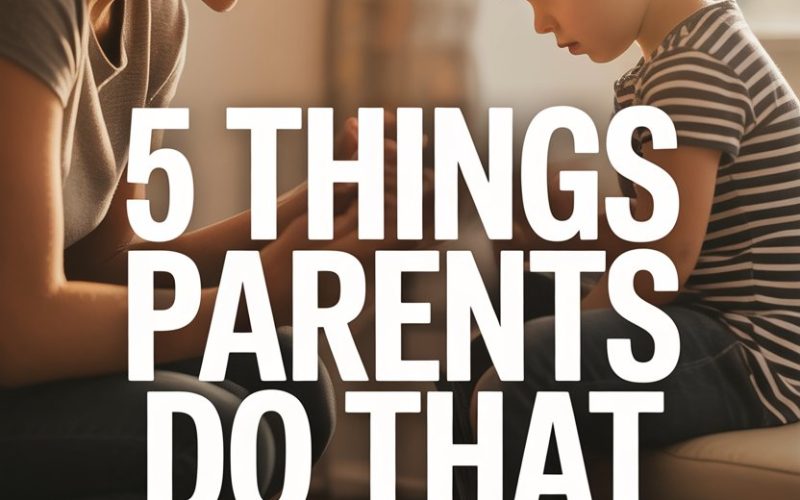Parenting: that never-ending improv show where you’re always on stage, but the script changes every five minutes.
Between work, school runs, and attempting to stop your little darlings from painting the dog, it’s easy to slip into habits that accidentally chip away at your “I’m-the-grownup-here” status.
1. The Empty Threat Tango
It starts innocently: “If you don’t brush your teeth right now, I’ll cancel your birthday party!” You both know there’s not a chance that’s happening.
The problem? Kids are absolute experts in bluff detection.
When consequences are repeatedly threatened but never delivered, your authority becomes as credible as a chocolate teapot.
Kids quickly learn that they can push limits with little fear of repercussions, and your words start to carry as much weight as a feather in a wind tunnel.
What works better? Keep consequences realistic and actually follow through. If you say screen time ends after one more episode, mean it. And if you’re not willing to enforce something, don’t threaten it.
Consistency earns respect—eventually. Expect some pushback at first; that’s just the sound of your authority muscle getting a much-needed workout.
2. Negotiating Everything Like a Mini United Nations Summit
“Eat two more bites and you can have dessert… okay, just one… fine, just lick the broccoli and you can have ice cream.” Sound familiar? Negotiating with kids over every tiny detail turns even simple requests into full-scale treaty talks.
Kids are born deal-makers, and when every expectation is up for debate, they get the message that your rules aren’t really rules—they’re more like polite suggestions.
According to research on parent-child dynamics, excessive bargaining can breed manipulation and erode respect for boundaries (Harvard Graduate School of Education).
Want a smoother dinner (and life)? Set limits and stick to them. Explain your reasoning when appropriate, but avoid turning every conversation into The Great Cookie Compromise of 2024.
Save negotiations for moments that really require collaboration—like agreeing on a family movie (and even then, may the odds be ever in your favour).
3. Apologising for Parenting
We’ve all had that moment: you set a rule, your child explodes like a volcano, and suddenly guilt creeps in.
Next thing you know, you’re backpedalling. “I’m sorry, but you do have to go to bed now. I know you want to stay up, but I’m really, really sorry about it.”
Here’s the thing: when you apologise for enforcing fair boundaries, you unintentionally signal that you don’t fully believe in your own decisions.
Before long, your child will sense your doubt and start treating your rules as optional.
Nobody’s suggesting you become the family dictator. Empathy is brilliant, but apologising for doing your job isn’t required. Instead, try acknowledging your child’s feelings (“I see you’re upset, I know bedtime can be tough”) while calmly holding the line.
Confidence breeds trust—even if your six-year-old thinks you’re an absolute monster for making them put on pyjamas.
4. Saving Them From Every Consequence
You watch your child forget their school project (again) and, with visions of public humiliation and future therapy bills, you rush in to save the day.
Maybe you deliver the missing folder, or perhaps you cover for them when they break something. It’s a classic case of “parent as safety net.”
While it feels loving to swoop in, chronic rescuing robs kids of crucial lessons. Children who never experience the natural outcomes of their choices may end up with a wobbly sense of responsibility—and a much lower tolerance for frustration.
A clinical psychologist at Child Mind Institute points out that a few safe stumbles actually teach problem-solving and resilience.
Allowing your child to occasionally face the music (like that forgotten homework or missing shin pad for footy) shows you trust them to handle real life.
Offer support, not a life raft, and watch their confidence grow—even if you have to bite your tongue at the school gate.
5. Public Power Struggles
Picture this: you’re at the supermarket, your child is mid-tantrum, and suddenly you’re locked in a staredown with a three-year-old over whether they can have a chocolate bar.
The audience? Half the town.
Public battles are almost impossible to win, because suddenly, pride (yours and theirs) is on the line. Kids are just as prone to “saving face” as adults, and those high-pressure moments can turn a minor issue into a headline event.
Experts at Raising Children Network recommend keeping your cool and minimising drama. Whisper instead of yell. Remove your child from the scene if you can, or simply state the rule and move on.
The less stage you give the conflict, the quicker it fizzles out (and the less likely you’ll have to change supermarkets out of sheer embarrassment).
Authority, But Make It Loving
Kids actually crave boundaries—it’s their way of knowing someone’s steering the ship (even if they’d prefer to be the captain).
Authority isn’t about barking orders or winning every argument; it’s about providing a steady, loving presence that shows kids you mean what you say.
Next time you feel your authority slipping, try one tiny tweak from the list above. Consistency today is tomorrow’s respect.
And if all else fails, remember: even if your toddler doesn’t listen now, they’ll be reciting your rules to their own kids one day—possibly with your exact exasperated tone.
Karma’s a beautiful thing.




